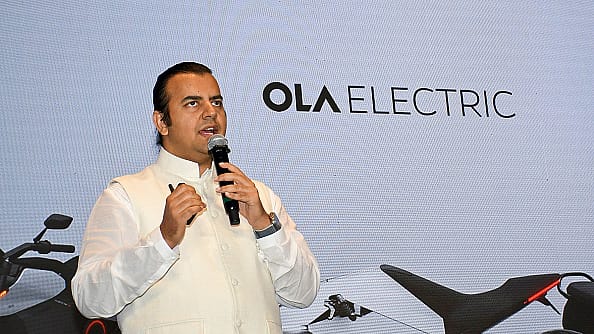Ola Electric denies role in LG Energy tech leak, says rivals attacking its 4680 Bharat Cell technology
ADVERTISEMENT

Ola Electric has junked latest reports suggesting its involvement in a leak of proprietary pouch cell technology (tech), saying that it has no such role in the leak of this particular technology from South Korea’s LG Energy Solution.
Denying any "commercial or research interest" in the said 'pouch cell technology', which Ola claims is an older technology, the company statement said its 4680 Bharat Cell is forcing foreign rivals to attack India's indigenous battery technology.
Ola Electric shares, amid the development, are trading at Rs 45.74, down 1.81% on the NSE today.
Media reports recently said that an unnamed former LG Energy Solution executive attempted to pass on "pouch cell technology IPs" to Ola Electric. In its response, Ola has said this tech is not even an area of research or commerical interest for it. "Here's the fact: The old and dated pouch cell technology, which the report claims was leaked, is not even an area of research or commercial interest for Ola Electric. Our 4680 Bharat Cell is based on the most advanced dry electrode technology in a cylindrical form factor and surpasses the pouch cell touted in media leaks."
Questioning the timing of such reports, Ola said it emerges at a telling time. "Just as Ola's 4680 Bharat Cell has entered commercial production." The company said the 4680 Bharat Cell represents India's first indigenous large-format cell and directly competes with the Korean majors in the domestic market. "The fear of losing market opportunities, including a significant customer in Ola Electric, is prompting the foreign rival to attack an indigenous battery innovation. The timing of this selective leak to South Korean media, and its swift, unverified replication by a section of the Indian press, appears dubious at best."
January 2026
Netflix, which has been in India for a decade, has successfully struck a balance between high-class premium content and pricing that attracts a range of customers. Find out how the U.S. streaming giant evolved in India, plus an exclusive interview with CEO Ted Sarandos. Also read about the Best Investments for 2026, and how rising growth and easing inflation will come in handy for finance minister Nirmala Sitharaman as she prepares Budget 2026.
Ola said Ola Electric is scaling up the production of the 4680 Bharat Cell, investing heavily in R&D and manufacturing infrastructure. "A misleading narrative of tech intrigue is being weaponised to undercut India's emergence as a global player in advanced energy technology," it claimed.
As per Ola Electric, it has 720 patent filings, of which 124 are granted. "Facts that speak for themselves: Ola's Battery Innovation Centre (BIC) in Bengaluru employs over 250 specialists drawn from top global cell technology companies. Ola Cell Technologies has established India's first operational Gigafactory, built with a cumulative investment of ₹2500 crore," Ola Electric said.
The company clarified that it values intellectual property and the rigorous effort that drives true innovation. "The government, through various initiatives, has created a powerful ecosystem for companies like us to innovate, file patents, and build world-class technology in India."
Ola Electric starts deliveries of S1 Pro+ with 4680 Bharat Cell
Ola Electric last week announced the start of deliveries of the S1 Pro+ (5.2kWh) with its 4680 Bharat Cell. The S1 Pro+ (5.2kWh) is the first product to be powered by the company's indigenously manufactured 4680 Bharat Cell battery pack, which promises more range, better performance, and enhanced safety.
S1 Pro+ (5.2kWh) is powered by a 13 kW motor offering, with an acceleration of 0-40 kmph in just 2.1. The S1 Pro+ (5.2kWh) comes with a range of 320km (IDC with DIY mode). S1 Pro+ gets four riding modes - Hyper, Sports, Normal and Eco, and also offers enhanced safety with category-first dual ABS, and disk brakes in front and rear.
Ola Electric’s Q2 net loss narrows to ₹418 cr
Ola recently reported a net loss of ₹418 crore on Thursday from ₹495 crore in the year-ago period, helped by the auto segment turning Ebitda positive for the first time to ₹2 crore. It delivered 52,666 units in the quarter, nearly half of the 98,619 units it delivered in the second quarter of last year.
That translated into revenue from operations of ₹688 crore, nearly half of the ₹1,214 crore reported in the same period last year. The Bhavish Aggarwal-led company has acknowledged that the growth of the electric two-wheeler industry has slowed over the past few quarters. “In the recently concluded festive season, sales were flat year on year. We see this as a healthy transition phase before the next wave of mainstream adoption, driven by value-conscious consumers recognising the superior performance and lower cost of EV ownership,” it said.
It reaffirmed its FY26 auto gross margin target of 40%, but has pruned its revenue forecast of approximately ₹3,000–3,200 crore, compared to ₹4200 crore–4700 crore projected last quarter. Its bottom-line focus, on the other hand, should exceed its first quarter guidance, said Ola.
